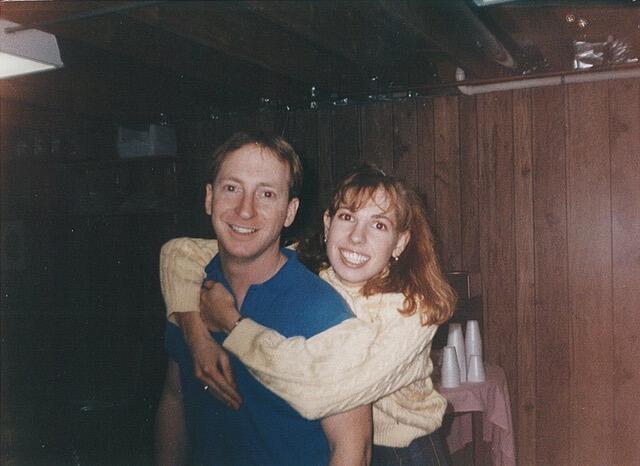Remembering My Aunt during Domestic Violence Awareness Month
Content Warning: Abuse
It was a cool October afternoon in 2006. I was sitting in my first grade classroom when the phone suddenly rang. My teacher went to answer. Like curious children do, my classmates and I all looked to see who the call concerned. With less than an hour in the school day to go, the air felt heavy with anticipation. Who was in trouble? Did someone throw rocks during recess again? Instead, I watched as my teacher’s face morphed into first shock, then sadness. I think there may have been a flash of anger too. She hung up the phone and turned to the anxious faces awaiting the verdict. When my teacher made eye contact with me, there was no hint of disappointment or frustration. Rather, she looked at me with some of the saddest eyes I’ve ever seen—she knew something I did not. She informed me that my parents were coming to pick me up from school, and I was to go meet them at the front of the building. That was the day my Aunt Marci died.
Three days prior, on October 23, my parents received a call to our house late at night. I was supposed to be asleep already, but I liked to stay up reading Junie B. Jones. I remember my dad yelling and my mom crying, but I didn’t know what the hubbub was about. I tried to drown it out, but everything in the house seemed to feel off as soon as the phone rang. My father had just received a call telling him that his sister had been placed on life support after being severely beaten by her husband. We would later learn that she was brain dead.
My aunt was a high school history teacher. She loved Jane Eyre, Jeff Buckley, and her Beatles vinyl records. I liked the way she spoke with passion and curiosity.
My favorite memory of my aunt also happens to be the last time I ever saw her. It was September 2006—I tagged along with my mom to pay my aunt a visit. I remember being mad that she had missed my birthday three months prior. When we got to my grandparents’ house to see my Aunt Marci, my mom was concerned. She didn’t look good. I didn’t even notice, though. I just ran into her arms and smiled. I wanted to show her that I’d lost my top two front teeth. I wanted her to know all about first grade, how I loved reading, and that I missed her. I remember asking her why she never came to my birthday. “Did you forget?” I cried. She gave me a sad smile and handed me my belated birthday gift: a stuffed animal hippo. She began to cry as she told me how bad she’d wanted to come, and how much she missed me, too. She promised never to miss another birthday of mine. I hugged her so tightly, feeling bad that I’d made her sad. I assured her it was okay to miss one birthday; I thought we had a whole lifetime ahead of ourselves.
When we discuss domestic or intimate partner violence, we often neglect to acknowledge the ways in which people with marginalized identities experience abuse at higher rates. For example, LGBTQ+ people are more likely to experience domestic violence in their lifetime than cis or heterosexual folks. One in four women will experience domestic violence, versus one in seven men. The five main types of abuse are physical, financial, sexual, emotional, and verbal. But one type not often discussed or acknowledged is the type my aunt experienced: religious abuse.
My aunt was raised in a traditional Jewish family while her husband was not. The abuse she endured partially revolved around her religious values and upbringing. Some time after she married in 2001, my aunt converted to Catholicism—her husband’s religion. It was a huge shock to my family. While we were never very religious, our connection to Jewish culture ran deep. My aunt had always seemed to value it just as much as anyone else, and it started to make my family wonder what was really going on in her relationship. Abuse is all about power and control, and my aunt’s husband made sure that over the course of their relationship everything my aunt did became entirely dependent on him. In the years after her marriage, my aunt attended family celebrations of Jewish holidays less and less frequently. Eventually, she stopped coming altogether. The same later happened for all of our family gatherings—birthdays, anniversaries, even non-Jewish holidays. My aunt was slowly stripped of her identity and her support system. Forced to change her name and religion, she was no longer the woman we had once known her to be.
October is both Domestic Violence Awareness Month and the anniversary of losing my aunt to intimate partner violence. This October, I’m thinking about how people impacted by domestic violence are navigating the COVID-19 pandemic. In 2020, people have been forced to quarantine with their abusive partners, friends, or family members. I often wonder what would be happening to my aunt right now if she were still alive, still in her abusive marriage. What would this have been like for her? What has this been like for people like her?
October is so oddly bittersweet—this one in particular. I miss our apple picking adventures. I miss my aunt’s warm laugh as I threw crab apples at my little brother. I hate that the same month I associate with so many fond memories of my aunt is the same month I lost her. I am reminded every day as we navigate Domestic Violence Awareness Month that everyone is entitled to a healthy, happy relationship; everyone has the right to feel safe and loved. This October is not like the others before it, with so many people forced into close quarters with their abusers for the safety and welfare of the country. I am thinking of these people, and want them to know this: You deserve better.
If you or anyone you know is currently experiencing domestic violence, please do not hesitate to reach out to a loved one or someone who can support you. There are so many resources out there, including the National Domestic Violence Hotline. You can contact them at thehotline.org or call them at 1-800-799-7233.








This was an amazing article. Thank you so much for sharing such beautiful and painful memories. 🕯❤
Thanks for mining your 6 year old brain for memories of Marci. She misses you too.
Thanks for sharing, Hannah. This is very important, tragic, and well-written. I’m sorry for your family’s loss, though apologies don’t do much.